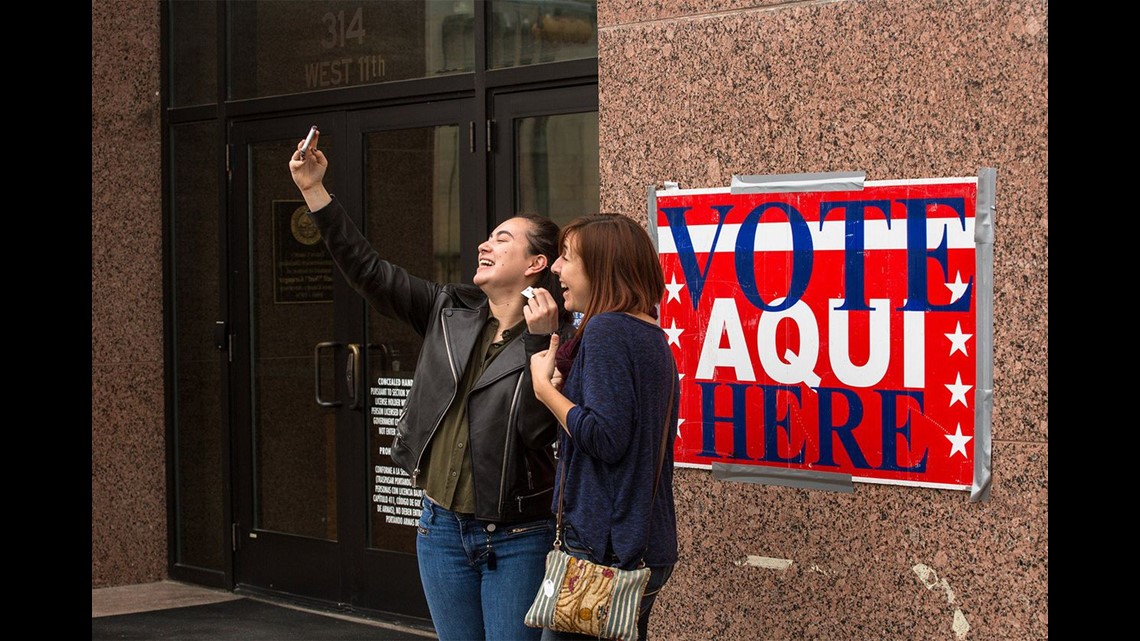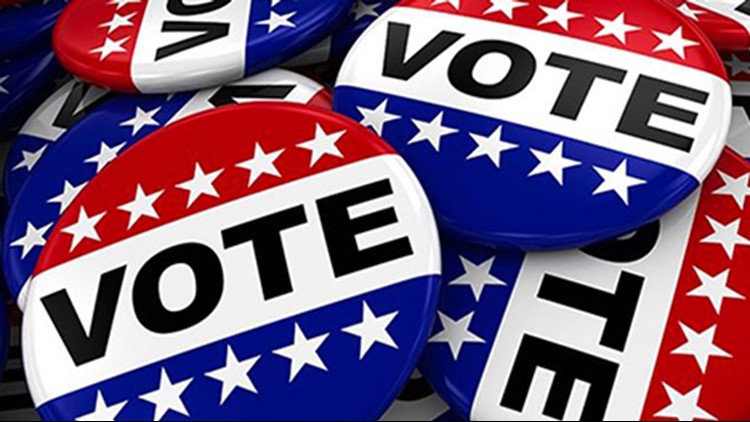After months of campaign promises, political ads and social media wars, Election Day for the midterms is finally here.
Millions of voters have already cast their ballots, shattering early voting records all over the country.
If you chose to wait until Election Day, you have to vote your precinct area.
Polls will be open from 7 a.m. to 7 p.m.
County-by-county
Check your county's website for Election Day polling places and sample ballots.
ELECTION DAY: KHOU 11 News election coverage, race results
What form of ID do I need to bring to the polls?
If you’re confused about what ID to bring to the polls, you’re not alone. The legal wrangling over the state’s requirements has turned rather complicated. Here are the seven types of photo ID that will be accepted at the polls:
- A state driver's license issued by the Texas Department of Public Safety (DPS)
- A Texas election identification certificate (issued by DPS)
- A Texas personal identification card (issued by DPS)
- A Texas license to carry a handgun (issued by DPS)
- A U.S. military ID card that includes a personal photo
- A U.S. citizenship certificate that includes a personal photo
- A U.S. passport
What if I don’t have one of the seven approved forms of ID?
If you have qualifying photo ID, bring it. But if you don't, you can still cast a ballot.
Voters who do not have any of those documents and cannot “reasonably obtain” them can still cast a vote if they sign a form in which they swear that they have a “reasonable impediment” from obtaining appropriate identification.
Those voters will also have to present one of the following types of ID:
Valid voter registration certificate
Certified birth certificate
Copy or original of a current utility bill, bank statement, government check, paycheck or other document that shows the voter’s name and address (any government document that contains a voter’s photo must be an original)
A “reasonable impediment” can include a lack of transportation, disability or illness, family responsibilities or lost or stolen identification, among other things. And election judges may not question a voter about the reasonableness of a claimed impediment.
The “reasonable impediment” declaration forms will be available at each polling location. Voters are not expected to fill them out ahead of time.
Know your ballot
Before you vote, you need to know who and what are going to be on your ballot. All Texans who vote decide statewide races, but ballots vary widely around Texas based on the candidates, bonds and other local issues unique to your location.
One simple way to find out which districts you live in is to plug in your residential address on Texas.gov, which will tell you your:
- Congressional District
- Texas Senate District
- Texas House of Representatives District
- Texas State Board of Education District
Voting rules
What devices should not be used in the polling place?
- Cell phones
- Cameras
- Tablet computers
- Laptop computers
- Sound recorders
- Any other device that may communicate wirelessly, or be used to record sound or images.


Who does this prohibition apply to at the polling place?
It applies to all voters within 100 feet of the voting stations.
What about voters with disabilities?
In recent years, advances in technology have enabled cell phones, tablets and other wireless communications devices to assist voters with disabilities. As an example, a voter may use a program/application on a cell phone to translate verbal communication into sign language, allowing the voter to understand communication by an election official. While this situation is not expressly addressed in the Election Code, an election judge or early voting clerk may use their authority to allow a voter to utilize these programs/applications at their discretion.
What about poll watchers, may they use these devices?
No. A poll watcher may not be accepted for service if the poll watcher has possession of a device capable of recording images or sound unless the poll watcher agrees to disable or deactivate the device. The early voting clerk or presiding judge, as appropriate, may inquire whether a poll watcher has possession of any prohibited recording devices before accepting the poll watcher for service.
What about election officials, may they use these devices?
Yes, if they are using the device to conduct official duties.
What if the polling location is also a business location where a person may be employed and needing to use a wireless communication device for employment related matters?
This is permissible if the person is acting in the course of the person’s employment.
What if a person enters the 100-foot area while using a wireless communications device or appearing to record sound/image?
The early voting clerk and the presiding judge have the authority to require persons to deactivate any such devices and further authority to require persons who do not comply to leave the early voting or election day polling place, as appropriate.
Questions or clarification should be directed to the early voting clerk or the presiding judge in your polling place, as appropriate.
How should voters be notified of this law?
A notice may be posted at the polling place by the early voting clerk or presiding judge. The notice should be posted where it can be read by persons waiting to vote. Our office has prescribed the wording of such a posted notice: Notice of Certain Devices Within 100 Feet of Voting Station.
Security Cameras in the Polling Place
Security cameras are essentially recording devices. If a building is being used as a polling place and has security cameras installed, our advice is to have the cameras turned off during the hours that voting is being conducted if it is possible to do so. If it is not possible, then making sure the cameras do not cover or film the voting areas is essential. The camera should not view the voting equipment at all.
In addition, recording of sound is a separate but equally serious problem. If it is possible to turn off that feature during the hours of voting, that will be necessary.
Written Material
Voters are allowed to bring written materials into voting stations to assist them in casting their ballot. However, it is important to remember that the prohibition on electioneering within 100-feet of the polling place does apply to written materials. Election judges and early voting clerks may use their discretion in determining if a voter is electioneering for or against any candidate, measure or political party through the use of written materials.
Sound Amplification Devices
It is also prohibited to use a sound amplification device to electioneer within 1,000 feet of the early voting or election day polling place; per Section 61.004 of the Code, a violation of this provision is a Class C misdemeanor.
Petition Signature Gathering
Any persons who wish to gather petition signatures must do so beyond the 100-foot distance markers. Petition signatures for any type of election may not be collected inside the early voting or election day polling place or within the 100-foot distance marker.
CLICK HERE for more information or call 1-800-252-VOTE(8683) for more on Texas Voting Rules.



